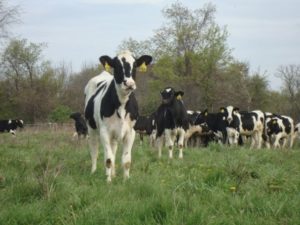Would a "National Checkoff" Fit Organic?
A National Research and Promotion program is on the horizon for the organic industry.
What is a National Checkoff Program?
Do the sayings, “Got Milk?”, “Beef: It’s What’s for Dinner”, or “Pork. The Other White Meat” sound familiar? These promotions are all part of National Research and Promotion Programs, also known as commodity checkoff programs. These programs, overseen by the USDA, collect funds, called checkoff dollars or assessments, from producers, handlers or processors of a particular agricultural commodity. The goal of these programs is to maintain and expand existing markets, as well as to develop new markets. Some checkoff programs also fund agricultural production research.
The Organic Trade Association (OTA) has lobbied for such a program to promote the organic industry and distinguish it in the marketplace. The OTA believes that a major challenge for the organic sector is consumer confusion about what organic stands for, and this program would seek to help the consumer understand all that organic delivers through collective resources and coordination.
Unfortunately, the organic community is split on their support of this idea for an organic checkoff program.
Hurdles to such a program:
- Currently, 100 percent organic operations are exempt from any checkoff assessments under the 2002 Amendment.
- Before an organic checkoff program could take place, organic products would have to become a single commodity. The Commodity Promotion, Research, and Information Act of 1996 does not allow for more than one commodity to be part of a checkoff program, but OTA’s proposal is to change that Act so that organics could become a single commodity.
- Several checkoff programs include a research component as an output, but because of the breadth of products included in this organic program, the research component would be the weakest link in the proposal. If all organic products are a single commodity, then research dollars would need to be spread evenly across every different production system. The diversity within organic production, i.e. field crops, orchards, vineyards, greenhouse production, etc., would prohibit the possibility of conducting thorough production research across all organic fields, which would be extremely expensive. Since production research would not be the main output of this program, funds would be focused on promoting organic products.
- Creating a conflict of interest is prohibited within the program. This means that all promotion must be generic, and that promotion cannot disparage another agricultural commodity. Funds cannot influence governmental action or policy or “pass through” the program in order to fund another organization. Any promotion that results from an organic checkoff program cannot promote organic food as better than conventional, but can explain exactly what “organic” entails as a production claim.
At a meeting of the New York Organic Dairy Task Force at the close of 2013, Richard Mathews, a representative of the OTA, delivered a presentation titled National Research and Promotion Programs and the Role of USDA in which he described the effort to launch an organic checkoff program. Ed Maltby, Executive Director of the Northeast Organic Dairy Producers Alliance, pointed out that the potential problems associated with such a program include the current existence of other organizations that could do such work; the OTA’s lack of involvement with those opposed to the program; and the OTA’s survey that they put out for feedback from the public. While the survey is accessible online for anyone that wants to give feedback, it does not allow one to oppose the program all together. The OTA may assume that anyone filling out the survey is supportive of the program, because it only collects opinions on how the program should be carried out, not whether they should carry it out or not. Many organic dairy farmers here in NY oppose the program, but other farmers may be supportive.
Despite some obvious resistance to this program, the current Farm Bill proposal (as of 12/2013) addressed some of the hurdles to an organic checkoff program, with identical language in both the House and Senate versions. This language would allow for a “technical fix” in the regulatory language so that all split operations (farms that produce both organic and conventional products) would be exempt from conventional checkoff assessments, and not just operations that are 100% organic. Those opposed to the checkoff at the NY Organic Dairy Task Force meeting were supportive of this measure.
The NY Organic Dairy Task Force
has been funded by the New York Farm Viability Institute since 2005. The Task Force is comprised of organic dairy and crop farmers, certifiers, processors, and related support services. It meets twice a year to assess opportunities and barriers to the organic dairy industry in New York, allowing farmers to offer and develop informed opinions. For more information click here.
While an organic checkoff program directed at consumer education is one way to help build the organic industry, it would be costly to attempt, and complicated to execute. Those involved in the organic dairy market know that the origins of organic milk in 1994 did not come from a clever media campaign, but from dairy consumers demanding an alternative to milk from cows treated with bST. Will the organic industry continue to grow through consumer demand, or does it need the help of the USDA’s Research and Promotion Program?
How best to keep the trust of consumers is something in which every organic farmer should invest interest. Organic producers and processors should consider for themselves whether or not they are supportive of paying assessments to a checkoff program in order to educate their consumers by reading up on the topic and participating in the discussion with fellow stakeholders.
To weigh in on the subject farmers and other stakeholders can go to one of the websites listed below:


